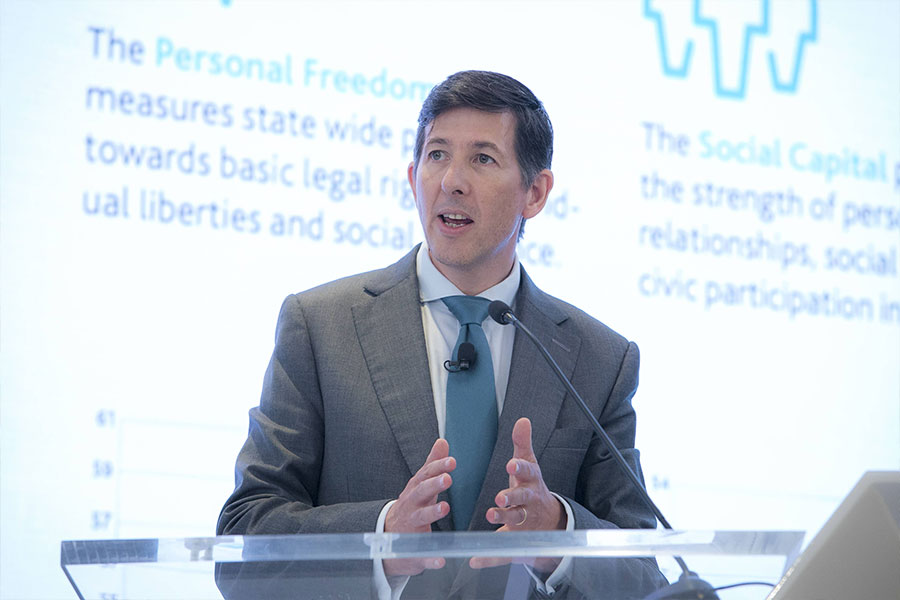
Mar 16 , 2019
By Tibebu Bekele
The polarisation of society into different identities and interest groups have sprouted to such opposing fringes that they cannot even talk with each other anymore. This is fast becoming the defining characteristic of our time. It is getting to the point that nations are failing to provide common values that can be shared by common citizens. This is a problem that is eroding foundations, not just peeling paint.
It is not just an African or third world problem either. The advanced countries of Europe and North America are as mired in it as the population-dense Eastern Continent powerhouses. The prime example of this is the United Kingdom’s Brexit fiasco.
“I suspect a deliberative forum before the Brexit vote would have identified the need to have a second process at the end of the negotiation,” wrote Matthew Taylor, policy advisor to former Prime Minister Tony Blair in a recent article published in the Economist magazine. “Many MPs and other high-profile figures … suggested a deliberative ‘citizens’ assembly’ as a way forward on Brexit.”
But those in power these days do not seem to like either deliberations or meaningful citizen participation as much as photo opportunities with adoring fans. They are not looking for deliberations but political performance.
The glibness of populists usually makes us pay the price for simplistic ideas on the back end of momentous decisions. Like a slick, fast-talking car salesman, they have us drive out of their lot in a shiny lemon of a car. Later, when we are rudely awakened by the reality of a breakdown in the middle of our commute, we start to question how we fell for their sweet talk. What they capitalise on is the universal human weakness of the desire to avoid confronting reality head on and with some measure of rationality.
We all want to hear good news. We prefer those who tell us what we want to hear rather than what is actually true. We prefer things as they ought to be rather than as they really are. Political entrepreneurs of all colours and stripes are masters at manipulating this weakness. Whether it is the right-wing populists selling the restoration of an exceedingly glorified past or the ethno-nationalists peddling an over-hyped historical wrong - they both count on the same thing, our intellectual laziness.
When a politician tells supporters that he will build a wall that stretches for thousands of miles over rugged terrain that costs billions of dollars and that another country will pay for it, what he is counting on is their intellectual laziness.
Reducing a problem as complex as migration and immigration that has global roots to a simplistic equation that can be solved by one simple action is not rational. But that is exactly the point. The appeal is to our emotions not to our intellect. It is not unreasonable to question whether it is just a utopian dream to believe one can solve healthcare or climate change by simply passing some golden-bullet legislation either.
When self-appointed activists describe with agonising detail a historical wrong perpetrated against a people centuries and decades ago, more often than not, what they want to elicit in us is an emotional bond formed out of the solidarity of victimhood.
It is not an invitation to brainstorm about the causes of the injustice. We are not being invited to the sacred but hard task of coming up with solutions that make sure this never happens to anyone again. Rather, we are invited to an orgy of retributions that turn us into perpetrators. That is easier for both the seller and the buyer. They are counting on our laziness, and we are obliging them.
I am now old enough to be automatically suspicious of people who tell me they have a simple solution to a complex problem. I am suspicious in the same way that I do not open the unsolicited emails that tell me I am the winner of a million-dollar prize! Been there, done that.
We need to wake up to the fact that there are no shortcuts. Life is hard. Problems are complex. Long term solutions can only be arrived at after hard thinking, loud debating and painful compromising. That is the road less traveled, but we ought to take it.
The starting point is accepting the complexity of our problems. There has to be an acknowledgement that no one has a monopoly on truth; to open up the marketplace of ideas and have the courage to compete by welcoming debate; the willingness to listen to the views of others with genuine curiosity; the humility to acknowledge mistakes and learn from them; and the moral fortitude to reject violence completely, in all its forms. We have to recognise violence for what it is - an attempt to impose defeated ideas on others.
The better way out of our problems is having genuine public deliberations rather than just political performances. A lot of the town halls and public dialogue forums are not being organised with a genuine interest to hear what citizens have to say. They are stage-managed, made-for-TV events meant to glorify the leaders of the groups. This is unfortunate, because it is a lose-lose proposition in the long term. It is a proposition with diminishing returns for both leaders and citizens will be relegated to the short end of the stick.
However, for bold leaders who really want to tackle the big issues of the day and come up with long term solutions, deliberative democracy is the way to go. Luc Huyse, the author of the book All Things Pass Except the Past, suggests three steps as a way to build a more inclusive democracy especially in post conflict societies.
These are coexistence - replacing fear by non-violence; trust - building confidence; and empathy - working towards understanding.
Public engagement can help leaders to build trust and empathy. However, to really engage with the public, leaders have to resist the urge to lecture. Though it is essential to explain public policy to citizens, it is equally important to remember being a leader does not make one an expert on everything. There is no shortage of elites preaching at citizens anyway. What is in short supply is humble leadership with the willingness to listen.
Another temptation to resist is leaders’ obsession with crowd sizes. When it comes to civic engagement, a policy of “the more the merrier” does not work. Only those that are real stakeholders of the topic of discussion should take part. If it is a town hall meeting to discuss the city plan, there is no need to invite the whole province.
In occassions where presenters are invited to the panel, it is also absolutely crucial that they be people who have made real, tangible contributions to the topic under discussion. They should be people who have earned the respect of their peers. Their role will be to raise the discussion to a higher level.
Doing all this groundwork may not be easy. The temptation to just do the usual political performance may be too great. But if it is real citizen deliberation that we want, there are no shortcuts.
PUBLISHED ON
Mar 16,2019 [ VOL
19 , NO
985]


Editorial | Feb 01,2020

Viewpoints | Jun 26,2021

Verbatim | Jan 07,2023

Sunday with Eden | Nov 29,2020

Exclusive Interviews | Oct 09,2021

Fineline | May 02,2020

Editorial | Feb 01,2019

My Opinion | May 04,2019

Fortune News | May 18,2019

Verbatim | Oct 10,2020

My Opinion | 131663 Views | Aug 14,2021

My Opinion | 128027 Views | Aug 21,2021

My Opinion | 125990 Views | Sep 10,2021

My Opinion | 123614 Views | Aug 07,2021

Dec 22 , 2024 . By TIZITA SHEWAFERAW
Charged with transforming colossal state-owned enterprises into modern and competitiv...

Aug 18 , 2024 . By AKSAH ITALO
Although predictable Yonas Zerihun's job in the ride-hailing service is not immune to...

Jul 28 , 2024 . By TIZITA SHEWAFERAW
Unhabitual, perhaps too many, Samuel Gebreyohannes, 38, used to occasionally enjoy a couple of beers at breakfast. However, he recently swit...

Jul 13 , 2024 . By AKSAH ITALO
Investors who rely on tractors, trucks, and field vehicles for commuting, transporting commodities, and f...

Jun 28 , 2025
Meseret Damtie, the assertive auditor general, has never been shy about naming names...

Jun 21 , 2025
A well-worn adage says, “Budget is not destiny, but it is direction.” Examining t...

Jun 14 , 2025
Yet again, the Horn of Africa is bracing for trouble. A region already frayed by wars...

Jun 7 , 2025
Few promises shine brighter in Addis Abeba than the pledge of a roof for every family...

Jun 29 , 2025
Addis Abeba's first rains have coincided with a sweeping rise in private school tuition, prompting the city's education...

Jun 29 , 2025 . By BEZAWIT HULUAGER
Central Bank Governor Mamo Mihretu claimed a bold reconfiguration of monetary policy...

Jun 29 , 2025 . By BEZAWIT HULUAGER
The federal government is betting on a sweeping overhaul of the driver licensing regi...

Jun 29 , 2025 . By NAHOM AYELE
Gadaa Bank has listed 1.2 million shares on the Ethiopian Securities Exchange (ESX),...